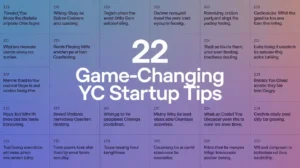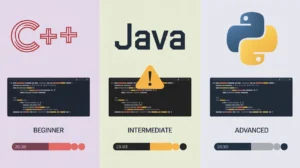India has emerged as a global fintech hub, with a thriving ecosystem of startups and established companies driving innovation in payments, lending, wealth management, insurance, and more. As we move into 2024, Indian fintech companies are shaping the future of digital finance by offering solutions that cater to both consumers and businesses, streamlining financial operations, and making banking accessible to all.
In this comprehensive guide, we’ll take a deep dive into the Top 50 Fintech Companies in India 2024 Revolutionizing Digital Finance. From well-known names like PhonePe and Razorpay to rising stars like Credgenics and Groww, we’ll explore their services, founding stories, user base, and financial performance. Let’s begin this exciting journey through India’s fintech landscape! 🚀📊
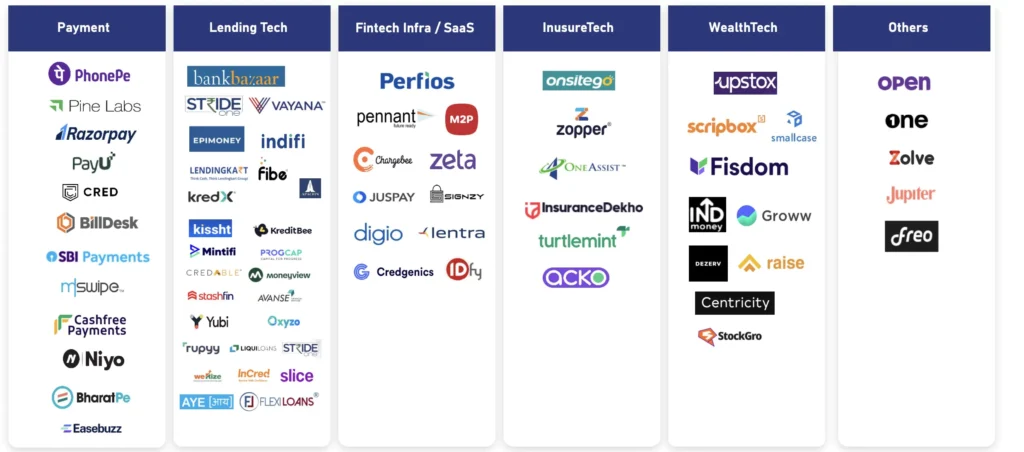
Payment Solutions 💳
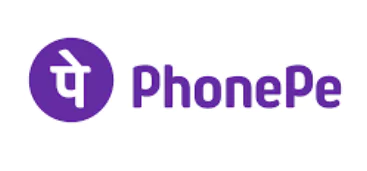
PhonePe
Founded: 2015
What it Does: A leader in UPI-based payments and financial services, PhonePe is a go-to app for digital payments, recharges, and bill payments.
Who Uses It: Over 450 million users across India.
Profit Status: Profitable as of 2023.

Razorpay
Founded: 2014
What it Does: Provides a payment gateway for online transactions, offering businesses seamless payment solutions.
Who Uses It: Thousands of businesses including Zomato, Swiggy, and Cred.
Profit Status: Profitable as of 2022.
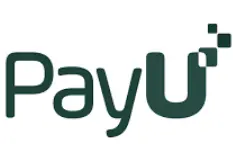
PayU
Founded: 2002
What it Does: Offers digital payment solutions for businesses, including payment gateways and consumer credit services.
Who Uses It: E-commerce platforms, online retailers, and consumers.
Profit Status: Close to profitability.

CRED
Founded: 2018
What it Does: A platform that rewards users for paying credit card bills on time and offers high-end shopping rewards.
Who Uses It: Credit card holders across India.
Profit Status: Operating at a loss due to high user acquisition costs.

BharatPe
Founded: 2018
What it Does: Provides UPI payments, QR code transactions, and financing solutions for merchants.
Who Uses It: Small and medium-sized businesses (SMBs).
Profit Status: Loss-making as it focuses on market expansion.

Pine Labs
Founded: 1998
What it Does: Pine Labs offers point-of-sale (POS) solutions, enabling merchants to accept card and digital payments with ease. It also provides loyalty programs, analytics, and BNPL services.
Who Uses It: Merchants and retailers, including large brands like McDonald’s, Apple, and Flipkart.
Profit Status: Profitable as of 2021, expanding into Southeast Asia.

BillDesk
Founded: 2000
What it Does: BillDesk is a payment gateway that allows consumers to pay bills and make digital payments securely. It works with utility companies, insurance firms, and banks.
Who Uses It: Banks, telecom companies, insurance firms, and individual consumers.
Profit Status: Profitable, acquired by PayU in 2021.

Cashfree Payments
Founded: 2015
What it Does: Cashfree is a payment gateway offering solutions like payment collections, disbursals, and recurring payments. It supports UPI, NEFT, IMPS, and card payments.
Who Uses It: E-commerce platforms, financial institutions, and educational institutions.
Profit Status: Profitable as of 2022, expanding its product suite.
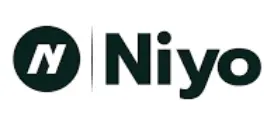
Niyo
Founded: 2015
What it Does: Niyo offers digital banking services tailored for blue-collar workers. It provides zero-balance accounts, prepaid cards, and financial literacy tools for workers.
Who Uses It: Blue-collar workers, gig economy employees, and SMEs.
Profit Status: Operating at a loss but growing user base.

Easebuzz
Founded: 2014
What it Does: Easebuzz provides payment solutions for SMEs, allowing businesses to collect payments through UPI, cards, and net banking with easy-to-integrate APIs.
Who Uses It: SMEs, educational institutions, and service providers.
Profit Status: Profitable, with a focus on the Indian SME market.
Lending Tech 💸

Indifi
Founded: 2015
What it Does: Indifi provides financing to small businesses through partnerships with banks and NBFCs. It focuses on sectors like travel, e-commerce, and retail.
Who Uses It: Small businesses, particularly in e-commerce and hospitality sectors.
Profit Status: Close to profitability with a growing loan book.

Progcap
Founded: 2017
What it Does: Progcap provides working capital loans to underserved micro and small businesses through supply chain financing.
Who Uses It: Micro and small enterprises in retail and distribution.
Profit Status: Operating at a loss, but showing strong growth.

MoneyView
Founded: 2014
What it Does: MoneyView offers personal loans and credit lines through a mobile app, providing quick access to funds with minimal paperwork.
Who Uses It: Salaried individuals and self-employed professionals.
Profit Status: Near profitability with a growing customer base.

CredAble
Founded: 2017
What it Does: CredAble focuses on supply chain financing, helping businesses manage working capital needs with real-time liquidity solutions.
Who Uses It: Large enterprises, MSMEs, and suppliers.
Profit Status: Profitable as of 2022, expanding across industries.

Rupeek
Founded: 2015
What it Does: Rupeek offers digital gold loans, allowing users to borrow against their gold assets with easy repayment options and competitive interest rates.
Who Uses It: Individuals looking to borrow against gold holdings.
Profit Status: Operating at a loss, but leading in the gold loan market.

FlexiLoans
Founded: 2016
What it Does: FlexiLoans provides quick unsecured business loans to SMEs, especially in sectors like retail, hospitality, and e-commerce.
Who Uses It: Small and medium-sized businesses in need of working capital.
Profit Status: Close to profitability, with a strong customer base in the SME sector.

Aye Finance
Founded: 2014
What it Does: Aye Finance provides microfinance solutions to small and underserved businesses, helping them grow by offering tailored loans.
Who Uses It: Micro and small businesses in sectors like retail, manufacturing, and services.
Profit Status: Profitable, with a focus on the microfinance market.

Avanse
Founded: 2013
What it Does: Avanse specializes in education loans, offering funding for students pursuing higher education both in India and abroad.
Who Uses It: Students and educational institutions.
Profit Status: Profitable, a leader in the education financing sector.

BankBazaar
Founded: 2008
What it Does: Compares loan and credit card offers, helping users make informed financial decisions.
Who Uses It: Consumers seeking loans or credit cards.
Profit Status: Approaching profitability.

Lendingkart
Founded: 2014
What it Does: Provides quick, unsecured business loans to small and medium-sized enterprises (SMEs).
Who Uses It: SMEs across India.
Profit Status: Profitable.

KreditBee
Founded: 2018
What it Does: Offers personal loans to salaried professionals, even those with limited credit history.
Who Uses It: Young professionals and first-time borrowers.
Profit Status: Operating at a loss but rapidly growing.
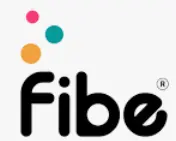
Fibe (Formerly EarlySalary)
Founded: 2015
What it Does: Provides short-term, salary-advance loans and credit lines.
Who Uses It: Salaried individuals and professionals.
Profit Status: Near break-even.

Kissht
Founded: 2015
What it Does: A consumer credit platform that offers easy EMI financing for online and offline purchases.
Who Uses It: Consumers making large purchases through EMIs.
Profit Status: Operating at a loss due to market competition.
Fintech Infrastructure & SaaS 🏗️

Perfios
Founded: 2009
What it Does: Provides financial data aggregation and analytics solutions for banks, lenders, and fintech companies.
Who Uses It: Banks, NBFCs, and fintech platforms.
Profit Status: Profitable.

M2P Fintech
Founded: 2014
What it Does: Enables fintechs and financial institutions to build payment products through API-based infrastructure.
Who Uses It: Startups and established financial institutions.
Profit Status: Profitable.

Zeta
Founded: 2015
What it Does: A banking tech platform providing cloud-native solutions for core banking, credit, and debit card processing.
Who Uses It: Banks, fintechs, and large enterprises.
Profit Status: Operating at a loss but rapidly growing.

Juspay
Founded: 2012
What it Does: A payment gateway and mobile payments provider, simplifying in-app payments for consumers.
Who Uses It: Paytm, Amazon, Swiggy, Uber.
Profit Status: Profitable.

Signzy
Founded: 2015
What it Does: Provides AI-powered digital KYC and onboarding solutions for financial services.
Who Uses It: Banks and financial institutions.
Profit Status: Approaching profitability.

Chargebee
Founded: 2011
What it Does: Chargebee offers a subscription management platform, helping SaaS businesses automate billing, invoicing, and revenue management.
Who Uses It: SaaS companies, e-commerce platforms, and online services.
Profit Status: Operating at a loss but growing globally.
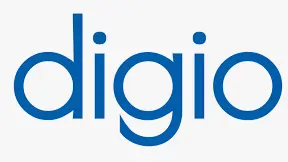
Digio
Founded: 2016
What it Does: Digio provides digital onboarding and document signing solutions, enabling paperless KYC and other regulatory processes for fintech companies.
Who Uses It: Banks, NBFCs, and fintech companies.
Profit Status: Profitable.
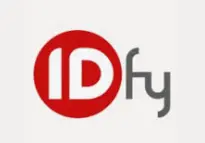
IDfy
Founded: 2011
What it Does: IDfy offers identity verification solutions, helping businesses prevent fraud by verifying individuals and documents digitally.
Who Uses It: Banks, NBFCs, e-commerce platforms, and gig economy companies.
Profit Status: Profitable, with a growing client base across industries.
WealthTech 📈

Centricity
Founded: 2020
What it Does: Centricity provides wealth management services for enterprises, offering financial planning, portfolio management, and investment advisory solutions.
Who Uses It: Corporates and high-net-worth individuals (HNIs).
Profit Status: Early-stage growth, with a focus on enterprise clients.

Raise Financial
Founded: 2021
What it Does: Raise Financial offers a suite of wealth management tools, including portfolio tracking and investment planning services.
Who Uses It: Retail investors and HNIs.
Profit Status: Loss-making but rapidly expanding its user base.

StockGro
Founded: 2020
What it Does: StockGro is a social investment platform that gamifies stock trading, allowing users to learn about the stock market through simulated trading environments.
Who Uses It: Retail investors and stock market enthusiasts.
Profit Status: Operating at a loss, but rapidly scaling with a focus on user engagement.

Groww
Founded: 2016
What it Does: A leading investment platform offering stock trading, mutual funds, and fixed deposits.
Who Uses It: Young investors and retail traders.
Profit Status: Profitable as of 2023.

Upstox
Founded: 2009
What it Does: An investment platform for stock trading, mutual funds, and digital gold.
Who Uses It: Over 10 million retail investors.
Profit Status: Profitable.

Fisdom
Founded: 2015
What it Does: A wealth management platform offering mutual fund investments, insurance, and tax-saving options.
Who Uses It: Individual investors and wealth managers.
Profit Status: Profitable.

Scripbox
Founded: 2012
What it Does: A digital wealth management platform helping users invest in mutual funds, fixed deposits, and goal-based investments.
Who Uses It: Retail investors looking for long-term financial growth.
Profit Status: Profitable.

INDmoney
Founded: 2019
What it Does: A super-finance app for investing in U.S. stocks, tracking expenses, and managing portfolios.
Who Uses It: High-net-worth individuals and retail investors.
Profit Status: Loss-making but experiencing rapid growth.
Other Notable Fintech Players 🌟

Open
Founded: 2017
What it Does: A neobanking platform that offers business banking, payment gateways, and credit management for SMEs.
Who Uses It: Small businesses and freelancers.
Profit Status: Near profitability.

Zolve
Founded: 2020
What it Does: Offers financial products to global citizens, including credit cards and loans for those moving between countries.
Who Uses It: Indian expats and international travelers.
Profit Status: Operating at a loss due to scaling efforts.

Jupiter
Founded: 2019
What it Does: A neobank offering personalized banking, spending insights, and easy bill payments.
Who Uses It: Young, tech-savvy customers looking for hassle-free banking.
Profit Status: Loss-making.

OneCard
Founded: 2018
What it Does: Offers a premium, metal credit card with flexible credit limits and rewards.
Who Uses It: Consumers seeking digital-first credit card services.
Profit Status: Near break-even.

Freo
Founded: 2020
What it Does: A neobank offering personal loans, credit lines, and savings accounts to consumers.
Who Uses It: Individuals looking for flexible credit options.
Profit Status: Loss-making.

Slice
Founded: 2020
What it Does: A neobank offering personal loans, credit lines, and savings accounts to consumers.
Who Uses It: Individuals looking for flexible credit options.
Profit Status: Loss-making.
Conclusion: Top 50 Fintech Companies in India 2024
India’s fintech landscape is booming, with players across payments, lending, infrastructure, wealth management, and insuretech transforming the financial services industry. These top 50 fintech companies are leading the charge in innovation, offering cutting-edge solutions that cater to a wide range of consumers and businesses.
While some companies are already profitable, others are investing in growth and user acquisition. As we move into 2024, these fintech giants and rising stars will continue shaping the future of digital finance in India, creating opportunities for millions of users and businesses.
Stay tuned for the next wave of fintech innovation! 🚀
Kubernetes, often abbreviated as K8s, is an open-source platform for automating the deployment, scaling, and management of containerized applications. While Docker manages individual containers, Kubernetes goes one step further, offering robust tools to handle complex multi-container applications across a cluster of machines.











